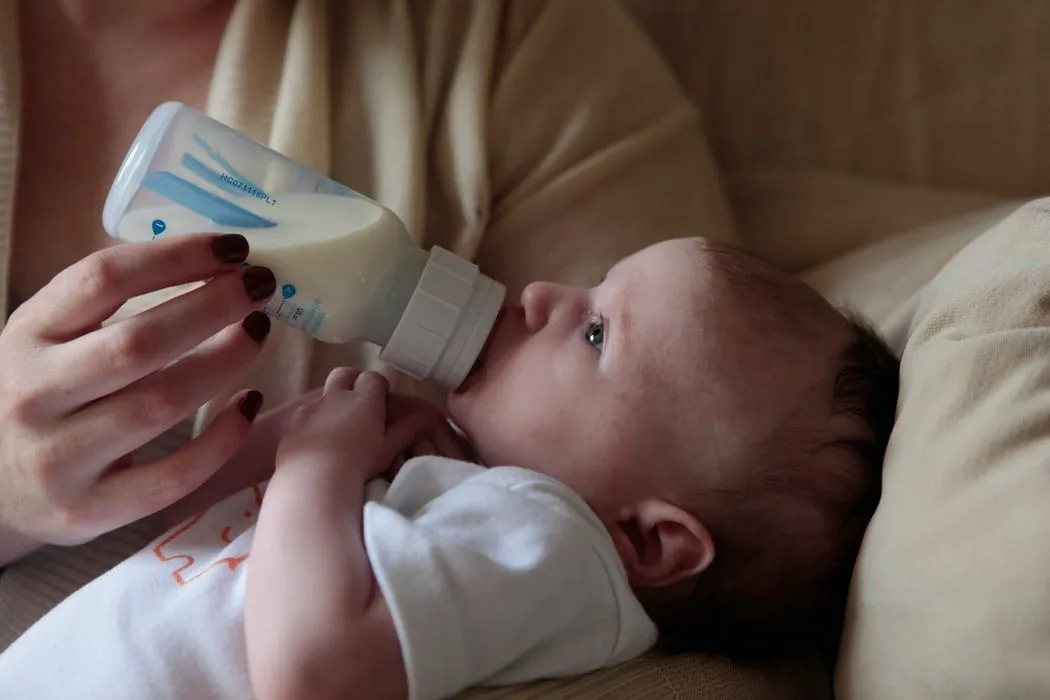FOR ALL AGES
The first month has flown by and your baby is already five weeks old!
They're now transitioning from newborn to infant (they grow up so fast!), and you're sure to be starting to settle into a routine when it comes to sleep, feeds, and play. But baby's development is also moving at quite a pace in these first few weeks of life; just when you think you have one thing cracked, a new challenge pops up somewhere else!
Whether you are thinking "my 5-week-old baby won't sleep", "my 5-week-old baby won't poop", or "my 5-week-old baby won't stop crying", Kidadl want to help. With advice on your 6-week-old baby or 7 week old baby too, we have a helpful collection of articles, containing all the advice, information, and support you need, for every step of the way.
And when it comes to your 5-week-old baby milestones, this post will explain everything you can expect to see with your little one's health, development, and sleep.
Your 5-week-old baby is still going to be doing a lot of sleeping. In fact, for the first three to four months, baby will be sleeping for anywhere between 14 and 17 hours a day.
Your baby most likely won't yet be sleeping through the night, but you might find they're able to sleep for slightly longer stretches than they did in the first few weeks. However, every baby is different and most will still be waking every two to four hours for feeding.
Your 5-week-old will also need plenty of naps throughout the day. Try to create a distinction between day and night times to help baby tell the difference and continue to develop their circadian rhythm, the in-built internal body clock we all have that regulates our sleep. Creating a more involved bedtime routine that includes a bath, cuddle, story, and even a baby massage, and keeping naps simple, with no added extras, can really help to create a strong 5-week-old baby sleep schedule. Infant milestones in the first few months of life can sometimes bring some periods of unrest so if your 5-week-old baby won't sleep well, these kinds of routines can really help.
As a parent, it's likely you're still going to be feeling pretty tired at this stage so you might not be thinking about creating a sleep routine just yet, and that's absolutely fine. But do take this time to get to know your baby and establish some consistencies, such as a regular-ish bedtime routine, when you feel comfortable. Even if you don't set up a 5-week-old baby schedule, anything small you do now will lay a strong groundwork for the future.

As well as lots of sleep, plenty of milk is also high on the priority list for your 5-week-old baby!
At this stage, you might find that their feeding schedule has stabilized a little, particularly for breastfed babies who might not be cluster feeding like they did in those first few weeks. Your little one should now be drinking anywhere between 24 and 32 ounces per day, split down between feeds of around four to five ounces, every three to four hours.
But it's important to remember that these figures are just a guide. Every baby is different, and the amount your baby will drink will differ based on all kinds of factors like the size of your baby, whether they are formula or breastfed, or if they sleep for longer or shorter periods at night. Instead of worrying too much about ounces and timings, pay closer attention to your baby's feed cues. Are they instantly spitting up after feeds, meaning they may have eaten a bit too much? Or after a feed, are they still sucking their fingers and looking around for more, indicating that they're still hungry?
As always, keep an eye on your baby's diaper, lots of wees and regular poops will show they're eating well. And you will also get a good indication of growth at your baby's health check, when their measurements will be taken and plotted on their growth chart by your doctor. The average 5-week-old baby will weigh around 9 lb but, again, this will vary from baby to baby.
Your 5-week-old baby is still going to be pretty limited in how much can they move and therefore you too are limited in what you can incorporate for play. But it doesn't mean daytime hours have to be boring! Babies at this age are becoming more and more alert and are desperate to engage in the world around them. Your 5-week-old will be fascinated by the sights and sounds of the outside world (and all the extra attention from cooing well-wishers!) whilst out with you for a walk in their buggy.
Back at home, they'll also love the combined movement and sound of small handheld toys like rattles, ribbon wands, or musical instruments. And basic sensory play, like squishy balls or even letting baby move their hands around in yogurt, is a great way for them to start exploring textures, developing their fine motor skills, and working towards those newborn milestones.
Continue with tummy time, on a playmat, activity center, or with the help of a support cushion, to help strengthen baby's neck and shoulder muscles. Baby should now be able to hold their head up at a 45-degree angle while laying on their stomach for tummy time, but be ready to catch them or give them support if needed as they still won't have the strength needed to keep their head up and stay in that position for long.
Remember to continue to incorporate more relaxed play as well, like reading stories, singing songs, and listening to lullabies. They're good ways to help baby wind down for bedtime, and they also provide necessary quiet time to temper the more excitable and energetic play sessions.

Babies are born with blurry vision, they see things best from a distance of around 10 in away. Supposedly because that's the approximate distance from the nursing baby to mom's face, what a gorgeous thought! And this is still true for your 5-week-old. They're working on focusing their vision on one thing for longer periods of time, but it will be a little while yet before baby can keep a steady gaze on moving objects, like mom walking across the room for example.
Your little one has a pretty good sense of smell, particularly when it comes to sniffing out mom. That's why one of your shirts can make a great comforter if you have to leave baby for a little while.
Baby also has a pretty good sense of hearing, and may even recognize music and lullabies they heard in the womb. And now they're becoming more alert, you also might notice baby turning their head to look when they hear a new sound.
The main way your baby will communicate with you is still through crying at this age, but you've probably worked out by now what some of those cries sound like and what they mean.
On top of the cries though, your baby is also experimenting with new ways to communicate. The most special one is the smile. Up until now, babies aren't able to smile consciously (although they might do it accidentally, especially when they're filling their diaper!) But now, when they're happy and having fun, they can finally show you that beautiful smile you've been waiting for.
Although talking is a long way off, baby will already be doing a lot of gurgling and cooing, as he or she practices using their mouth and tongue. Baby won't be able to mimic you yet, but they are trying, so keep encouraging them and talk to them as often as you can. It doesn't matter if you're just reading out the shopping list, baby will love the interaction with you, and they get some added learning!
As well as more attempts at vocal communication, baby's communication may now expand to include using physical actions as well. They're not at the stage of pointing yet, but you might notice them start to wriggle and get visibly excited when they see mom, or milk, getting closer.
Baby will also start to respond more consciously to your communication, especially being calmed and soothed by your voice, when you read a story or sing a lullaby.
If you found this article helpful, then why not take a look at our sample 2-month-old schedules or find out what milestones you can expect with your 9-week-old baby too?
Read The Disclaimer
At Kidadl we pride ourselves on offering families original ideas to make the most of time spent together at home or out and about, wherever you are in the world. We strive to recommend the very best things that are suggested by our community and are things we would do ourselves - our aim is to be the trusted friend to parents.
We try our very best, but cannot guarantee perfection. We will always aim to give you accurate information at the date of publication - however, information does change, so it’s important you do your own research, double-check and make the decision that is right for your family.
Kidadl provides inspiration to entertain and educate your children. We recognise that not all activities and ideas are appropriate and suitable for all children and families or in all circumstances. Our recommended activities are based on age but these are a guide. We recommend that these ideas are used as inspiration, that ideas are undertaken with appropriate adult supervision, and that each adult uses their own discretion and knowledge of their children to consider the safety and suitability.
Kidadl cannot accept liability for the execution of these ideas, and parental supervision is advised at all times, as safety is paramount. Anyone using the information provided by Kidadl does so at their own risk and we can not accept liability if things go wrong.
Kidadl is independent and to make our service free to you the reader we are supported by advertising.
We hope you love our recommendations for products and services! What we suggest is selected independently by the Kidadl team. If you purchase using the buy now button we may earn a small commission. This does not influence our choices. Please note: prices are correct and items are available at the time the article was published.
Kidadl has a number of affiliate partners that we work with including Amazon. Please note that Kidadl is a participant in the Amazon Services LLC Associates Program, an affiliate advertising program designed to provide a means for sites to earn advertising fees by advertising and linking to amazon.
We also link to other websites, but are not responsible for their content.
Was this article helpful?



We’ll send you tons of inspiration to help you find a hidden gem in your local area or plan a big day out.



Check your inbox for your latest news from us. You have subscribed to:
Remember that you can always manage your preferences or unsubscribe through the link at the foot of each newsletter.